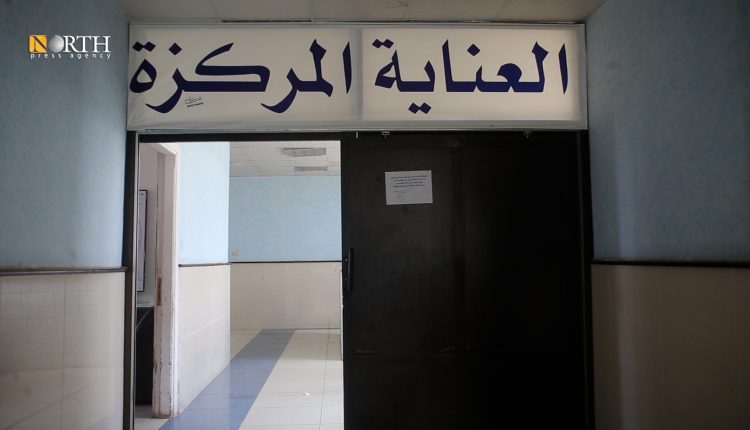By Ali al-Beki’
DEIR EZ-ZOR, Syria (North Press) – Residents of Deir ez-Zor, eastern Syria, are voicing frustration over the poor healthcare services provided by the National Hospital, amid severe shortages in medical staff and equipment.
Over the past years, deteriorating security conditions and dire living circumstances have led the majority of doctors and healthcare workers to leave Deir ez-Zor. According to residents, this immigration has had a profoundly negative impact on the region’s already fragile healthcare system.
Deteriorating services
Suleiman Dhiab al-Othman, a resident of Ayyash village in the Deir ez-Zor countryside, told North Press that medical services at the National Hospital in Deir ez-Zor are “severely limited.”
Al-Othman explained that resources are so scarce that sometimes no medical staff is present in a department for an entire 24-hour period, leaving people in a real crisis.
He stressed that the National Hospital is the only public healthcare facility serving the entire Deir ez-Zor Governorate, calling on the transitional government, the Ministry of Health, and both local and international organizations to urgently provide support.
Al-Othman recounted how he had to pay eight million Syrian pounds for his nephew’s treatment at a private hospital, only to receive minimal care. “Private hospitals exploit the desperation of patients,” he said.
Lack of specialized staff
Salwa al-Jawish, head of the burns department at Deir ez-Zor National Hospital, told North Press that they have a burns unit, but no specialized doctors.
“Due to the absence of burns specialists, general surgeons manage burn cases. Approximately 30 percent of critical cases are referred to Damascus for advanced care.”
Al-Jawish noted that only three nurses work in the department—and only during morning hours—while follow-ups are handled by general surgeons or resident physicians, not burn specialists.
“This is the only burn treatment unit serving the city and countryside of Deir ez-Zor,” she said. “We have seen a spike in cases, especially after regime forces left landmines and unexploded ordnance, leading to injuries among children.”
Fuel smuggling accidents have also contributed to an increase in burn cases, with the number of patients rising from around 50 to nearly 150, according to al-Jawish. “We only have basic emergency supplies—no reconstructive surgery, grafting, or advanced burn treatment,” she added.
The hospital also lacks basic burn care equipment such as dry or wet sterilization devices, burn care units, manual or electric dermatome devices, and a debridement machine.
“Even if we had specialized doctors, the lack of proper equipment leads to patient deaths,” al-Jawish said.
Hassan al-Tahtouh, an orthopedic surgery resident and head of the resident physicians at the hospital, told North Press that the emergency surgical department receives many cases from the Syria-Iraq border areas, given that this is the only hospital serving the region.
“The emergency department handles between 100 and 150 cases each day. Approximately 4 to 5 orthopedic surgeries are performed daily. In addition, 3 to 4 general surgeries are carried out each day.”
Severe challenges
The National Hospital receives hundreds of emergency cases daily, ranging from gunshot wounds and traffic accidents to fractures and complex surgeries. Despite the dedicated efforts of its medical staff, the hospital is overwhelmed and unable to meet the growing demand, according to its administration.
Mohammad al-Fallah, the hospital’s administrative director, told North Press that patient numbers have surged significantly since the fall of the al-Assad regime.
This overwhelming pressure has taken a toll on both the staff and medical supplies, including gauze, cotton, and equipment. Al-Fallah expressed hope that this shortfall will be addressed soon.
He also pointed to a severe shortage of specialized personnel. “For example, we have no anesthesiologist in the operating room, no burn specialist, and no thoracic surgeon,” he said. “This is the current reality—we might have one or two doctors in some specialties, but that is not enough. We need more.”
Equipment shortages
Al-Fallah noted that the entire Deir ez-Zor Governorate lacks an MRI machine. The region spans from the Iraqi border to the outskirts of Raqqa, covering a vast area along the Euphrates River with hundreds of thousands of residents.
“The second device we urgently need is a CT scanner. We currently have just one, which is under tremendous pressure. We fear it could break down,” he said.
He appealed to international health and humanitarian organizations to help provide an MRI machine, a second CT scanner, a catheterization device, and upgrades for outdated equipment.
The hospital currently has 24 medical devices—only 13 of which are operational. The rest require maintenance or complete replacement, as many date back to the year 2000 and are nearing the end of their usable life.

